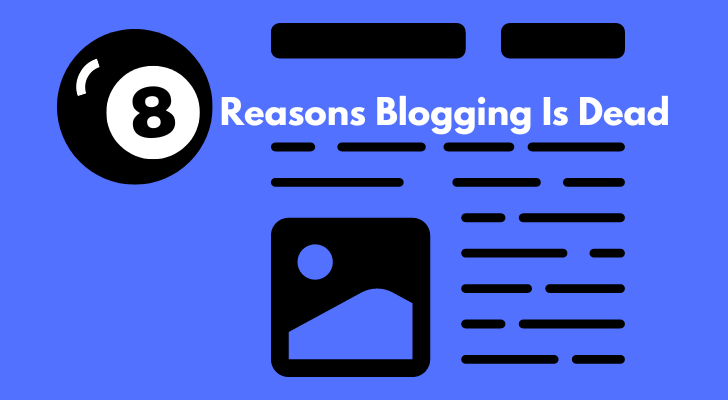In the early 2000s, blogging was considered a revolutionary way to share content and engage with readers. It allowed people to express themselves in a way that had never been done before and gave them the freedom to create whatever kind of content they wanted. But today, with Instagram, YouTube and TikTok being so popular, it’s easy to see why blogging popularity is declining. Blogging is dying, if not already dead. And there’s nothing you can do to keep your blog alive.

Outdated and Misleading Statistics
They say, “77% of internet users read blogs.” And this one sentence has been copied and pasted over and over again by various websites and infographics. It looks like the stat originated in the Social Media Today site sometime in 2014 or before but it has been deleted for a long time. (Thanks to the She Owns It site for proving this.)
According to Statista, a quarter of young people (aged between 5-18) read blogs.
Are these statistics useful? Not particularly. In fact, not at all. What kind of blogs? How often? If you google something, which we all do, and the site you visit happens to be a blog, does (did) it count?
1. Blogging Is a One-Way Communication
The internet has drastically changed over the past two decades. Blogging is a one-way communication method. There’s the blogger, and there’s the reader. The reader may be able to leave a comment at the end of each blog post which is up to the blogger to approve or disapprove and delete.
People don’t need that kind of limited choice - there are plenty of social networks where they can share their opinions in multiple directions. And the response they may receive is instant. People are no longer interested in passively reading someone else’s “weblogs”.
2. Bloggers Are Talentless
Anyone who is willing to write can publish a blog. Sure, some bloggers are proficient writers and have an excellent sense of humor, attention to detail and all. But there’s nothing special about being a blogger.
If you are already specialized in a particular niche - you are a successful antique dealer, a physician, a ventriloquist, for example - blogging may be a great platform to share your expertise with others. But if you are trying to find "something you're passionate about" because you want to blog, then good luck. You can give it a try if you really want, but it’s a little too late. You may just be another talentless blogger like me.
3. Blogging Is The Proliferation of Fake News

From a blogger’s point of view, you can write anything you want (except something illegal, encouraging violence, discriminatory, etc. If you do, you know there’ll be negative consequences.)
But from a user’s point of view, personal blogs are just so subjective and biased, they cannot be trusted 100%. That’s another reason for the decline in popularity. Because blogging is the proliferation of fake news.
In an age of misinformation, it is increasingly difficult to trust the content that is published on blogs. Many people rely on social media platforms for their news instead of blogs because they can see what other users are saying about a particular story.
4. Not Enough Advertising Income
Gone are the days when we were able to make decent advertising income just by blogging. Advertising revenue has declined significantly in the past decade.
One of the reasons is the rise of ad blockers - we all know that pop-up ads are irritating. They eat up a significant amount of memory and slow the loading time. Worse still, popup ads could contain malware, and an ad blocker installed on our browsers helps us browse safely. Even if we don’t have an ad blocker, we are so used to closing the website as soon as ads come into view.
Plus, advertisers know how ineffective ads on anonymous blog sites could be because fewer people click on ads nowadays. As a result, bloggers have had to find other ways to make money, such as through sponsored posts or affiliate marketing.
5. Bloggers Write Only To Make Money
Let’s face it. They all say things like;
- “I’m here to help my readers 100%.”
- “It brings me the greatest joy to share my knowledge with others.”
If their sole purpose of blogging is to help others, why are they displaying ads and call-to-action buttons with affiliate links?
Bloggers (myself included) keep writing content that makes money directly or indirectly, rather than writing to benefit readers. This means that their content is not necessarily the most useful or informative for readers, but instead may be crafted to appeal to advertisers and generate revenue.
As a result, the quality of the content can suffer as bloggers prioritize advertising dollars over providing helpful information. Readers are smart enough to recognize when this happens so they know what type of information they're getting from a blog and can make an informed decision about whether or not it will provide them with useful insights.
6. Big Businesses Dominate Blogs

It’s harder for individual bloggers to rank high on Google searches because of authority sites run by companies. They can afford to publish multiple blog posts per day because they have enough resources to hire multiple writers.
Individual bloggers’ efforts are in vain because they are pushing themselves too hard, competing against giants.
7. Decline in Sponsored Posts
Sponsorships have also declined in recent years. This is because website owners are becoming more aware of the potential negative publicity that can come from sponsoring a blog, and so they are increasingly unwilling to do so.
Many sponsored posts have ridiculous content, they either are poorly written or lack integrity (e.g. miracle beauty products.) More users are aware of that fact and fewer of them are fooled by such content...which is a good thing.
8. Blogs are Full of Filler and Fluff
Ever heard someone say obvious common sense as if it were revolutionary advice? “Get medical advice if you've been vomiting repeatedly for more than 3 days.”
Blogs are often ridiculously lengthy and contain filler and fluff. There are a few reasons behind this.
- Most bloggers write content with SEO in mind. Short blog posts tend not to rank on Google, so they tend to stretch content without realising they’re actually fluffing.
- Writers are hired and paid by word count. They use as many fluffing expressions to achieve the required number of words.
- Even blog posts on authority sites are filled with fluff (usually written by guest writers). This gives individual bloggers a false sense of encouragement. "If they are allowed to be so boring, so am I. Maybe I can outrank them with length."
We find a lot of boring blogs partly because the “longer the better, never mind the content” has become the norm.
Blogging Is Boring
“Blogging is a great way to share your thoughts and ideas with the world.”
“It’s a great way to connect with like-minded people.”
Do you seriously believe so? Or do you think blogging is boring and it’s a waste of time?
What Do You Advocate?
